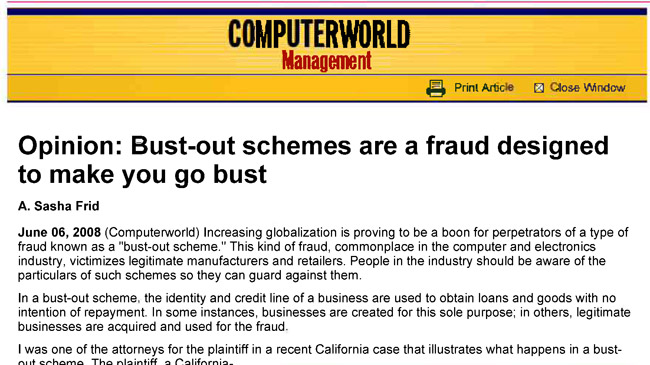Opinion: Bust-out schemes are a fraud designed to make you go bust
By A. Sasha Frid
June 06, 2008
Increasing globalization is proving to be a boon for perpetrators of a type of fraud known as a “bust-out scheme.” This kind of fraud, commonplace in the computer and electronics industry, victimizes legitimate manufacturers and retailers. People in the industry should be aware of the particulars of such schemes so they can guard against them.
In a bust-out scheme, the identity and credit line of a business are used to obtain loans and goods with no intention of repayment. In some instances, businesses are created for this sole purpose; in others, legitimate businesses are acquired and used for the fraud.
I was one of the attorneys for the plaintiff in a recent California case that illustrates what happens in a bust-out scheme. The plaintiff, a California based manufacturer of computer hardware with operations in China, had entered into a relationship with the defendant, a California-based distributor that had a relationship with Wal-Mart.
At first, the defendant seemed to be what it had represented itself to be. It sold the plaintiff’s products to Wal-Mart and remitted payments as agreed. As trust developed between the two companies, the defendant began promising much larger sales volumes, and the plaintiff agreed to stock the defendant with a large inventory of products. But as the volume of shipments increased, payments from the defendant began to lag. Finally, the defendant stopped sending payments altogether and refused to return any of the stockpiled goods.
In all, the defendant sold more than $55 million in plaintiff’s products to Wal-Mart, but the plaintiff received only a small percentage of that. As the relationship soured, the defendant shifted gears, claiming that the products were defective and that it faced class-action lawsuits from domestic customers and other liabilities.
The plaintiff filed suit against the defendant and its president, alleging breach of contract, breach of fiduciary duty and conversion. More than 20 witnesses took the stand over the course of the trial. The plaintiff put forth expert witnesses, including financial experts and former FBI agents who were familiar with bust-out schemes.
At trial, the defendant attempted to capitalize on recent media attention paid to defective products imported from China, including toothpaste and toys, in an effort to legitimize its claims. This strategy proved to be unsuccessful. At the end of the day, the jury recognized defendant’s dealings as fraudulent and awarded the plaintiff $46 million in damages.
International computer technology suppliers should be on high alert when seeking business partners, given the potential for this type of activity. This case serves as a warning to foreign products manufacturers that are similarly situated and demonstrates that being duped in a bust-out scheme could mean extensive litigation in a courthouse far from home.
A. Sasha Frid is an attorney in the Los Angeles-based law firm of Miller Barondess LLP. He specializes in complex commercial litigation with a focus in business, entertainment and real estate disputes. He also has experience defending corporations and individuals in high-stakes white-collar crime cases.

